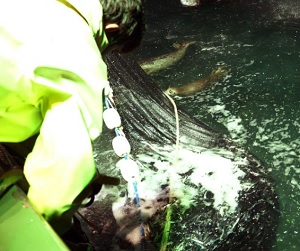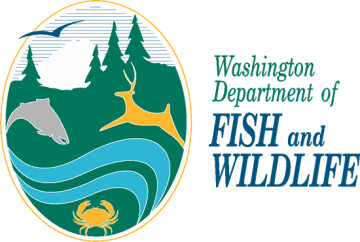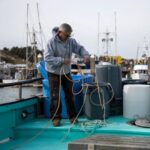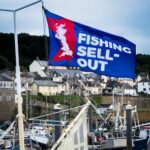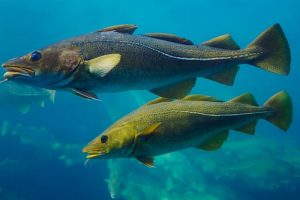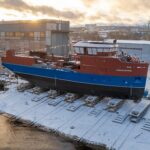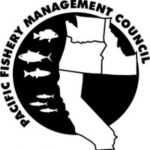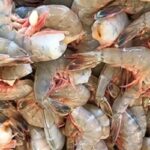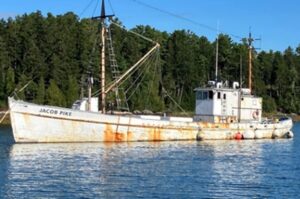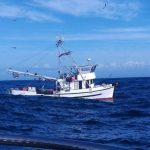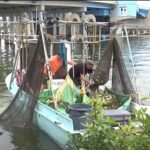Category Archives: Pacific
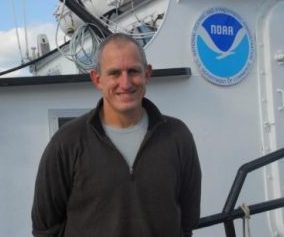
Troubling questions, concerns raised about off-shore wind farms
Oceanographer Jon Hare listed the effects of offshore wind development on the marine environment. There’s disturbance to the sea floor during installation of turbine platforms.,,,“Putting a pile into the sediment in essence is habitat alteration,” said Hare, a science and research director with Northeast Fisheries Science Center.,,The questions about offshore wind, of course, aren’t limited to the $2.8-billion Vineyard Wind project,,,,but there are more than a dozen proposals in the works all along the Atlantic Coast and plans for the Great Lakes and the West Coast. >click to read< 21:06
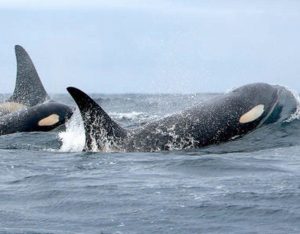
PCFFA Reacts to News of Jeopardy Finding for Salmon, Southern Resident Killer Whales
As reported today in the LA Times, the National Marine Fisheries Service determined in an important draft biological opinion [link to the document here] that the changes to California’s Central Valley Project (CVP) and State Water Project (SWP) operations championed by the Department of the Interior would result in jeopardy to spring and winter run Chinook salmon, steelhead trout, and southern resident killer whales (SRKW). The draft opinion was transmitted to the Department of the Interior, which immediately convened a team of outside lawyers and scientific staff from its own agencies to adulterate NMFS science and suppress the document’s findings. >click to read< 20:18
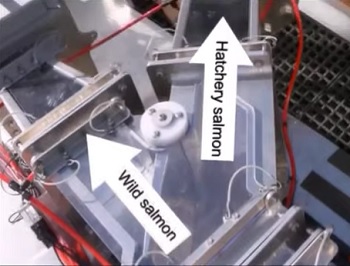
Salmon cannon could restore the population in the Upper Columbia
A so-called salmon cannon could restore salmon populations in parts of the upper Columbia river that have not seen the fish in 90 years.The salmon cannon is actually a fish-propelling system made by a Seattle company called Whooshh Innovations, which uses a series of tubes and computers to gently detour the salmon around dams, “In truth, the fish aren’t shot anywhere. The fish actually swim in on their own, and they are then sorted into a tube that’s misted inside so it’s very slick and air pressure gently movies them up and over the dam,” >click to read<10:16
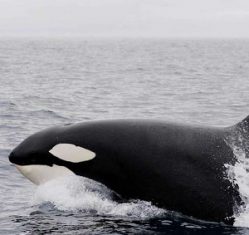
Enviros sue Trump Administration for Failing to Protect Endangered West Coast Orcas
Conservation groups sued the Trump administration today for ignoring a legal petition to protect critically endangered Southern Resident killer whales in the heart of their Salish Sea habitat. Today’s lawsuit, filed in the U.S. District Court in Washington by the Center for Biological Diversity and Orca Relief Citizens’ Alliance (ORCA), follows news that three more of these starving orcas are presumed dead, dropping their population to just 73. >click to read< 18:12
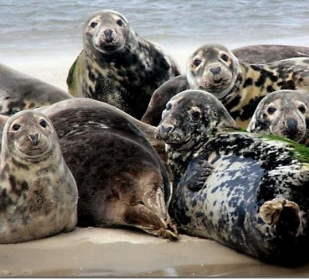
NOAA Seeks Nominations for Scientific Review Groups under the Marine Mammal Protection Act
NOAA Fisheries will publish a Federal Register Notice on Monday, August 19, 2019, soliciting nominations to three independent marine mammal scientific review groups (SRG). We would like your assistance to identify qualified candidates. The three independent regional SRGs, covering Alaska, the Atlantic (including the Gulf of Mexico), and the Pacific (including Hawaii), were established under section 117(d) of the Marine Mammal Protection Act to provide advice on a range of marine mammal science and management issues. >click to read< 16:27
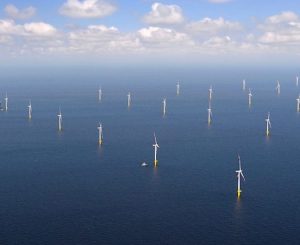
Castle Wind signs MoU for 1GW California floater
Floating wind power developer Castle Wind has signed a memorandum of understanding (MoU) with a Californian utility to enter into a power purchase agreement for output from a 1GW offshore wind farm in the US Pacific Ocean.,,, EnBW North America and Trident Winds joint venture Castle Wind is in the early stages of developing the 1000MW project, located about 30 miles off the coast from the city of Morro Bay.,,, Last year the Morro Bay Commercial Fisherman’s Organisation and the Port San Luis Commercial Fishermen Association, entered into a mutual benefits agreement >click to read< 12:30
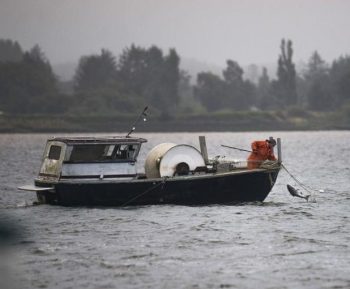
Lower Columbia River mainstem commercial gillnet fishing ; Non-treaty gillnetters get 45 hours through Aug. 29
With less than half of the 10-year average of fall Chinook salmon expected to return to the Columbia River this year, the two-state Columbia River Compact opened commercial gillnetting in the lower river and in pools upstream of Bonneville Dam for treaty commercial gillnetting.,,, The Compact met this week, Monday, Aug. 12, at the Washington Department of Fish and Wildlife’s regional office in Ridgefield to consider early fall Chinook mainstem gillnetting, deciding on 5 nine-hour overnight periods, for a 45-hour total for commercial non-treaty gillnetters beginning Aug. 14 and ending Aug. 29. >click to read< 16:34
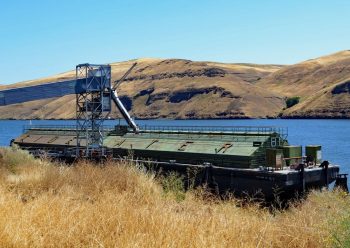
Wheat farmers fear extinction if Snake River dams are removed to help orcas
In the southeastern corner of Washington state, wheat goes down the river, while salmon are trucked up around dams on the road. “And taxpayers pay for all of it,” said Sam Mace, with Save Our Wild Salmon. “Isn’t there some option of switching this around,” Mace asked, >(Salmon Cannon?)< “the fish on the river and the wheat off the river?” In Western Washington, it could seem like a no-brainer: The orcas of the Salish Sea are hungry, because there are fewer and fewer of the salmon they depend on. Removing the four dams on eastern Washington’s Snake River would help the salmon that use the river to spawn–and thus the whales that eat the salmon. But the view from eastern Washington is different. There, the dams are important to the state’s wheat growers, fourth- and fifth-generation farmers who are worried about their future. >click to read< 13:33
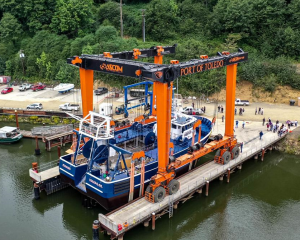
Investment in a boatyard. Port of Toledo offers strategic lessons for Astoria
Marine workers, business leaders and politicians gathered earlier this month to watch the trawler Pegasus get lowered into the Yaquina River from the former Sturgeon Bend Boat Works, a shuttered boatyard acquired from Fred Wahl Marine Construction in 2010 by the Port of Toledo. Widening and modernizing the vessel took more than 10 months, $3 million and tens of contractors. Purchasing and developing the boatyard has cost Toledo more than $10 million, largely from state grants and loans.Toledo’s vision to turn the boatyard into a thriving economic generator offers lessons to the Port of Astoria. >click to read< 22:55
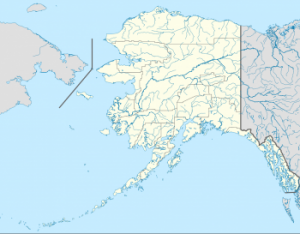
Boom or bust in Adak? Politics will decide
Adak is 1,200 miles west of Anchorage in the Aleutian Islands in the center of some of Alaska’s last “derby style” fisheries. Now, a great political struggle between some large Seattle-based corporate fishing companies and this Aleut community will determine whether Adak and it’s value-added approach to seafood development survives or if these valuable Alaska fisheries resources are simply added to the portfolios of the consolidated fishing companies. These large fishing companies already have exclusive Bering Sea and Aleutian Islands fishing privileges with an aggregate value in excess of $2 billion. In contrast, if Adak and Alaska lose this struggle, the community is not likely to survive. >click to read< 18:58
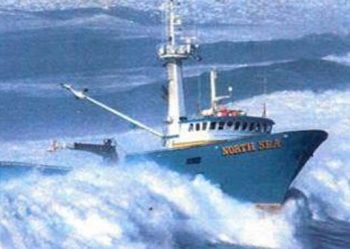
Repeat offender poses as worker, tries to steal fishing vessel from Ballard shipyard
Doug Dixon, general manager of Pacific Fishermen Shipyard and PFI Marine Electric just off Shilshole Avenue, said the crime was carefully-planned. He said that a woman who appears to be homeless and spends time around the shipyard took a hardhat from a construction site next door and used it to gain access to the shipyard. “She looked like a worker coming into the yard, so nobody questioned her,” Dixon said. With the hardhat disguise, she climbed aboard Pacific Fishermen’s $12 million North Sea,,, >click to read< 17:24
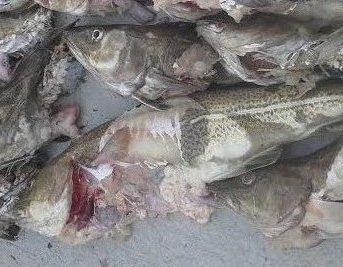
Government of Canada establishes Atlantic Seal Task Team
The sustainable management of Canadian fisheries is important to fish harvesters whose livelihoods are supported by the ocean. The Department of Fisheries and Oceans (DFO) ensures that the best available science is considered when making management decisions for seals. However, DFO has continuously heard concerns by fish harvesters about the relationship between seals and fish populations. Listening to these concerns, DFO is taking action to address a concern that encompasses not only Newfoundland and Labrador, but all Atlantic Canada and Quebec coasts. >click to read<16:18
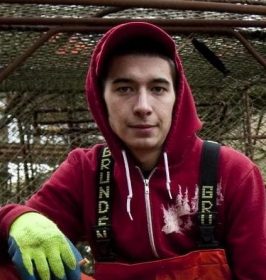
‘Deadliest Catch’ Star Jake Harris Sentenced To Prison After Police Chase
Jacob “Jake” Harris, who headlined the show until 2012, was convicted of driving under the influence and possession with intent to manufacture or distribute heroin. He pleaded guilty to the felony charges and was sentenced on Aug. 1. Harris, 33, is the younger brother of Josh Harris, who currently captains the multi-million dollar fishing vessel, the Cornelia Marie, on “Deadliest Catch.” He’s being transferred to a Washington state penitentiary today, according to the Skagit County District Attorney’s Office. >click to read< 13:25
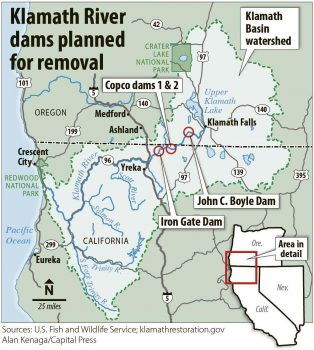
Cost, timeline for removing Klamath River dams updated
Removing four hydroelectric dams along the lower Klamath River in Southern Oregon and Northern California is expected to cost just under $434 million and could happen by 2022, according to a new filing with the Federal Energy Regulatory Commission. The nonprofit Klamath River Renewal Corp. submitted plans with FERC in 2018 to decommission and demolish J.C. Boyle, Copco Nos. 1 and 2 and Iron Gate dams, which block about 400 miles of upstream habitat for migratory salmon and steelhead. >click to read< 19:06
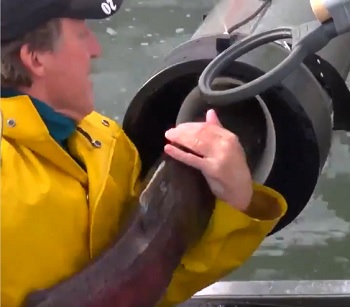
The internet has discovered the “salmon cannon,” and it has become a sensation
“What is a salmon cannon?” I hear you ask. Gather round, children, and I will tell you.,,, A video on Twitter emerged today that shows officials loading large, living fish into an enormous tube to help them bypass a dam that would take days to traverse otherwise. The pipeline allows fish to get from one side of the dam to the other in just a matter of seconds.,,,The dam in question is the Cle Elum Dam, in Washington state. The cannon has allowed Sockeye salmon to go across the dam for the first time in 100 years, Video >click to read< 17:29
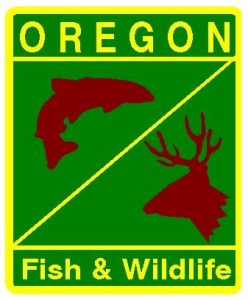
ODFW using grant to track whales on Oregon Coast, reduce fishing gear entanglements
The Oregon Department of Fish and Wildlife received a $278,856 federal grant Friday to help fund its program to improve environmental conditions for whales off the Oregon Coast by reducing the risk of whales entangled in fishing gear. The Funded Species Recovery grant, awarded by National Oceanic and Atmospheric Administration, was announced Aug. 9, by U.S. Sens. Ron Wyden and Jeff Merkley, both Oregon representatives. >click to read< 10:32
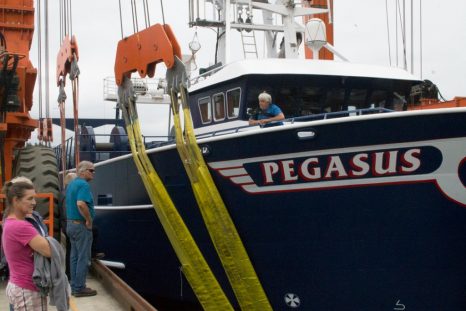
Extreme makeover!
It’s been a 10-month grind, but Captain Justin Johnson and the crew of the Toledo trawl vessel Pegasus have a formidable machine for taking on not just a half million pounds of Pacific whiting at a shot but also the frigid conditions of a January Bering Sea. Thousands of tons of steel went into the project at the Toledo Boat Yard. >click to read< 14:34
Newport: Two fishing vessels collide near the mouth of the jaws Monday evening – no injuries – photos, August 20, 2014, The F/V Blue Horizon and the F/V Pegasus,,, >click to read<
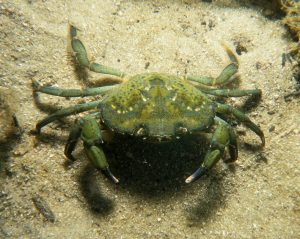
Transported in ship ballast, Invasive crab poses threat to coastal ecosystem
Alaska normally welcomes European tourists. One traveler who’s been officially banned, however, is the European green crab, an invasive species with the potential to overrun coastal ecosystems. The green crab has already colonized Washington and parts of British Columbia, and conservationists want to delay its arrival in Alaska for as long as possible. The green crab lacks predators outside its original habitat,,, >click to read< 20:35
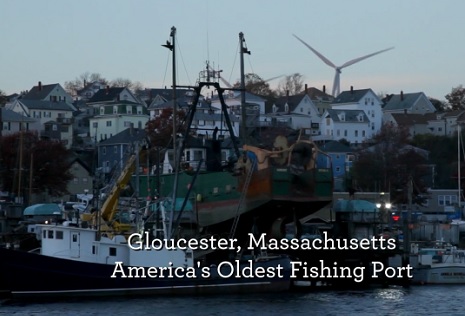
FISH & MEN: A film on the High Cost of Cheap Fish
We hope the fishing families and pioneers featured in this film will inspire a movement,,, For centuries, cod fed the world and helped build a nation. Nowhere was that more so than in Gloucester, Massachusetts – America’s oldest fishing port. But, today all that has changed… From California to Maine, small fishing communities struggle to survive. The iconic American fisherman is in a perfect storm of foreign competition, erratic regulations and rising costs. Trailer, photo’s, of some of the best people on the planet. Please support this effort. >click to read< 14:51
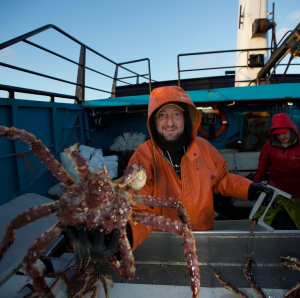
How Much Do Deckhands on ‘Deadliest Catch’ Actually Make?
If you’re a fan of Deadliest Catch, then you already know that the Discovery show follows a cast of captains and their crew members as they embark on the dangerous career of Alaskan crab fishing, (and West Coast Dungy fishing). But you’ve also likely wondered why anyone would put themselves in this much potential harm. The answer is easy: Money. According to former stars and captains Gary and Kenny Ripka, the heads of the vessels can make quite a bit during one season. >click to read< 08:39
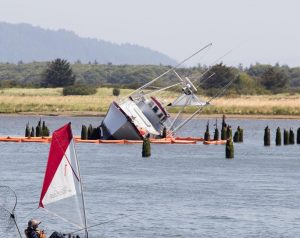
Koko wrecks against channel pilings
The narrow Ilwaco channel proved it can endanger anyone when the 47-foot tuna boat Koko got tangled up in a trap of rotten old pilings and eventually overturned. Bad weather not in the forecast caught up with the Koko and skipper Harvey Cosky at about 10 p.m. last Friday night as the vessel was returning from a successful albacore trip. Even with decades of local experience, the skipper and his veteran one-man crew couldn’t help being blown off course in the murky conditions. Personnel at U.S. Coast Guard Station Cape Disappointment were unable to get to them ,,, >click to read< 18:23
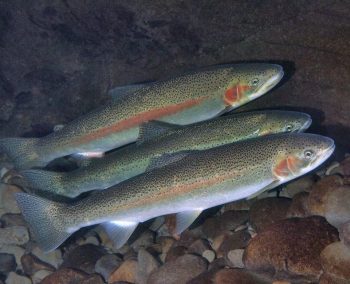
Still recovering from escaped Atlantic salmon, Cooke Aquaculture now wants to farm steelhead
In August 2017, at least 263,000 farmed Atlantic salmon escaped from Cooke Aquaculture’s net pens at Washington’s Cypress Island into Washington state waters. The incident launched a legislated process to phase out nonnative finfish farming in Washington by 2025, and a $332,000 fine for Cooke Aquaculture, a Canadian multinational seafood company. As Cooke sunsets its Atlantic salmon farming in the state, it has experienced at least two viral outbreaks impacting more than 1 million fish; and was fined for more water quality violations. But not quite two years since the disaster, >click to read< 12:21
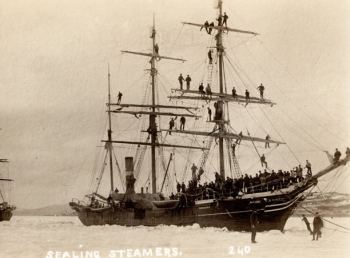
The real Sea Wolf: Captain Alexander MacLean (Part 1)
Many people are aware that Jack London spent time in Korea as a war correspondent during the Russo-Japanese War (1904-05).,, But London has another connection (although tenuous) to Korea through one of his greatest fictional antagonists ― Wolf Larsen. Larsen may have been fictional but he was based on one of London’s acquaintances ― Captain Alexander MacLean. In the 1890s, Nova Scotian-born Alexander MacLean was a well-known name in the regions surrounding the northern Pacific Ocean. Standing 175 centimeters tall and weighing about 86 kilograms, he stood out among his peers, not so much because of his physical size or his blue eyes, or even his 45-centimeter-long moustache (he kept the tips tied together behind his head), but because of his personality and exploits. >click to read< 15:21
The real Sea Wolf: Russians try to tame ‘Sea Wolf’ Captain Alexander MacLean (Part 2) – >click to read<
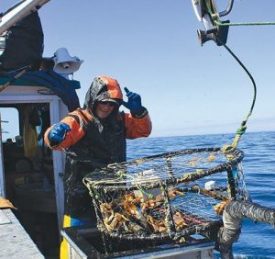
Crabbing in Oregon brings Florence’s Novelli family together
Down the dock from ICM Restaurant in Historic Old Town Florence is a metal gate that leads down to the boats on the water. In a little blue boathouse on the left of the dock is Novelli’s Crab and Seafood, owned and run by Amber Novelli and her husband Kyle — the only active commercial crabbers and fishermen who live and work in Florence. It’s about 8:40 a.m. when Amber and Kyle hop onto their turquoise crabbing boat called The Aquarius and head downriver to the fuel station, which resembles a typical gas station, except for its location on the end of a dock. Today, they are going out to check about a quarter of their 200 crab pots. >click to read<20:13
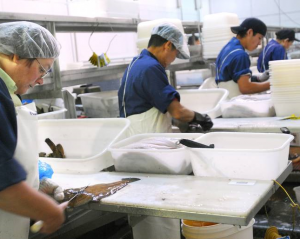
Longtime Bellingham fish processor to close portion of operation and reduce staff
A longtime seafood processor is shutting down a part of its operations, resulting in the layoff of about 40 workers. Bornstein Seafoods CEO Colin Bornstein said in an interview with The Bellingham Herald that the business is closing the groundfish processing portion of its Bellingham operations later this month. It will keep its value-added albacore tuna operations intact, which employs about 25 people. The decision to close the groundfish processing portion was because of changing regulations and commercial fishing fleet consolidations, Bornstein said. >click to read< 16:58
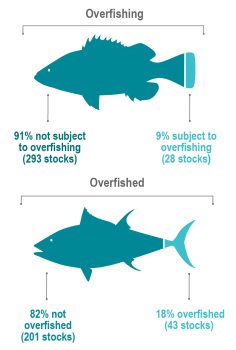
2018 Report to Congress on the Status of U.S. Fisheries
Number of US fish stocks at sustainable levels remains near record high – Today, the National Oceanic and Atmospheric Administration (NOAA) released the Status of U.S. Fisheries Annual Report to Congress, which details the status of 479 federally-managed stocks or stock complexes in the U.S. to identify which stocks are subject to overfishing, are overfished, or are rebuilt to sustainable levels. >click here to read a rundown of the report< To read the report, 2018 Report to Congress on the Status of U.S. Fisheries >click here< 15:26
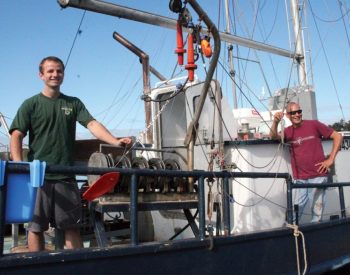
Tuna hit the docks
Newport’s fleet of jig fishermen are hooking into albacore tuna, finally bringing to the docks a sizable number of warmwater fish whose arrival is keenly awaited by customers looking to grill fresh and can for winter. Mark Whittier, captain of the 51-foot schooner Kathleen, had five tons of fish aboard on Tuesday, following a 13-day trip. Price at the plant for frozen fish is around $3,400 a ton. Fish have been averaging around 12 pounds. >click to read< 11:49
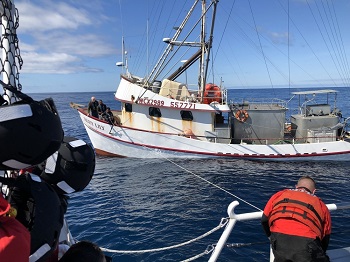
Coast Guard completes marathon tow of disabled fishing vessel off Oregon coast
Coast Guard crew members aboard three separate vessels rescued a 50-foot commercial fishing vessel disabled 116 miles west of Newport Wednesday. The 41-ton vessel, Ruby Lily, which reported 6 tons of albacore tuna and three crew members aboard, was safely moored in Yaquina Bay after a four-day opperation. Watchstanders at Coast Guard Sector Columbia River received notification at 4:35 p.m. Sunday from the crew of the Ruby Lily, who reported that the vessel’s rudder was stuck. >click to read< 10:01






